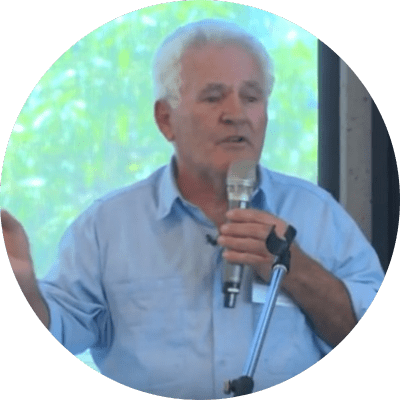- Regenerate Earth was established in January 2019, after having been Healthy Soils Australia since 2005. We provide soil-related solutions to inspire and support more regenerative agricultural, forestry, and urban communities.
- Regenerate Earth guides and supports leaders to find innovative ways to increase the amount of land transitioning to regenerative. Thus making make these practices accessible in Australia and worldwide.
- Regenerate Earth is pioneering innovative microbial technologies to manage the natural ecology of soils and to help farmers avoid productivity impediments as well as enhancing the nutritional integrity and premium health value of their products. This understanding is essential to secure water and the food requirements into the next century.
- The co-founder of Regenerate Earth is Walter Jehne, an internationally recognised soilmicrobiologist and innovation strategist. He has immense field and research experience in soils, grasslands, agriculture and forests at local, national (CSIRO and Science Adviser to Australia’s National Soil Advocate), and international (UN) level. Walter’s specialisation is the role of soil microbes’ symbiotic processes in the ecology of diseases, plant health, nutrient and waste cycling, soil pedogenesis and the regeneration of bio-systems.
Regenerate Earth Director Phill Lee presented microscopy workshops in Andhra Pradesh, India. This series of three videos by Andhra Pradesh Community Managed Nat has more details.
Related:
The Indo-German Global Academy for Agroecology Research and Learning in Pulivendula, Kadapa (Andhra Pradesh state, India) was launched in July 2023. It hosts India’s First Farmer Scientist Course in Natural Farming: Rythu Sadhikara Samstha: a four-year Farmer Scientist Course (FSC) in Natural Farming.- Intake in FSC is about 1,000 per batch. The instruction is in 25 Research and Learning Centres in districts. Initially, these students would come from AP and gradually, FSC expects to start enrolling students from outside AP.
- Farmer Scientist students are youth, who are the best practicing natural farmers for the last 3 years and have completely transitioned to natural farming. During the course itself, they practice A-Grade model from first year and earn monthly farm incomes. Farmer Scientist earns Rs. 25,000 - 50,000 per month from A-grade NF farming during the course itself from the first year.
- One week a month is classes and they spend three weeks in their own field so they have to become model farmers. 75% of the learning in FSC is through practical and experiential learning through their own field, own experiments, and conceptual inputs via classroom and digital learning. Farmer Scientists receive intense mentoring. This apprenticeship-mentorship is the fulcrum of the FSC.
- In order to get the degree, passing the examination is just one factor. They have to show that they are able to generate monthly incomes: 50 000 rupees per month. Over 4 years they need to train 10-15 cadre and 50 farmers in the village to become A-grade natural farmers.
“We are proud to cooperate with IGGAARL and its Farmer Scientist course. A combination of theory and practice is important. Underlying Natural Farming is knowledge-intensive and knowledge is the only resource that will increase only when it is shared.” Iris Harder, Principal Portfolio Manager, Natural Resources & Climate – Asia, KfW Development Bank
Iris Harder, portfolio Project Manager at @KfW_FZ_int, during her visit to @iggaarl, opines that @APZBNF demonstrated how #NaturalFarming will change the lives of #smallholder farmers. @vijaythallam @AndhraPradeshCM @PMOIndia @NITIAayog pic.twitter.com/Odv4LZGVQ0
— Andhra Pradesh Community-managed Natural Farming (@APZBNF) June 21, 2024
Resource:
Rythu Sadhikara Samstha (2023) Assessing the Impact of APCNF[Andhra Pradesh Community Managed Natural Farming]A Comprehensive Approach Using Crop Cutting Experiments2nd Interim [Kharif] Report 2022-23 # 94 pp.
- The report presents the results of the survey into the impact of Andhra Pradesh Community Managed Natural Farming (APCNF or CNF in short) on farming conditions in Kharif 2022-23. This is fifth in the series of similar studies conducted under the aegis of RySS, Government of Andhra Pradesh, which is set up to campaign for the spread of natural farming in the state.
- The study compares the performance of 1,331 farmers practicing CNF with 731 of non-CNF farmers. The sample is chosen to compare the differences in farming conditions across major crops. However, the results at agroclimatic zones, and farmers of different sizeclasses, tenure groups and social groups, have been provided, wherever possible.
- The farming conditions are judged against the parameters that reflect the costs and returns from farming. It also brings to the fore the ways in which CNF contributes to the well-being of those who practice it.
Avoidance of the use of agrochemicals not only improve the soil quality and natural resources, but also resulted in improvements in the households’ health outcomes. (page 16)
On average CNF crops need 22 additional labour days, i.e., 20 percent higher number of days, compared to non-CNF crops. Compared to non-CNF crops, 25 percent of higher own labour and 15 percent of higher hired labour are used in CNF crops. (page 16)
About 81 percent of CNF households and 91 percent of non-CNF households have active or current loans. (page 16)







No comments:
Post a Comment